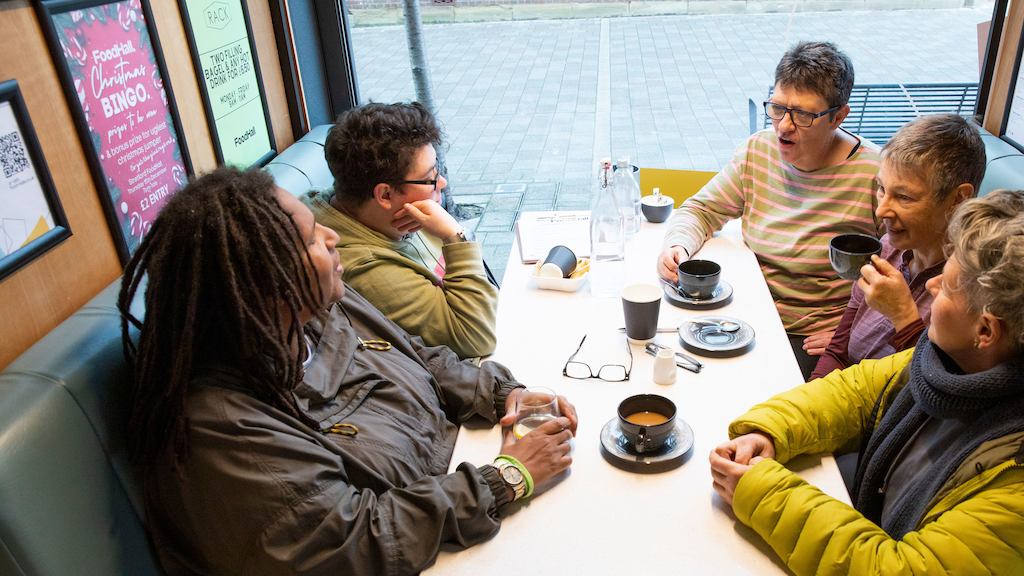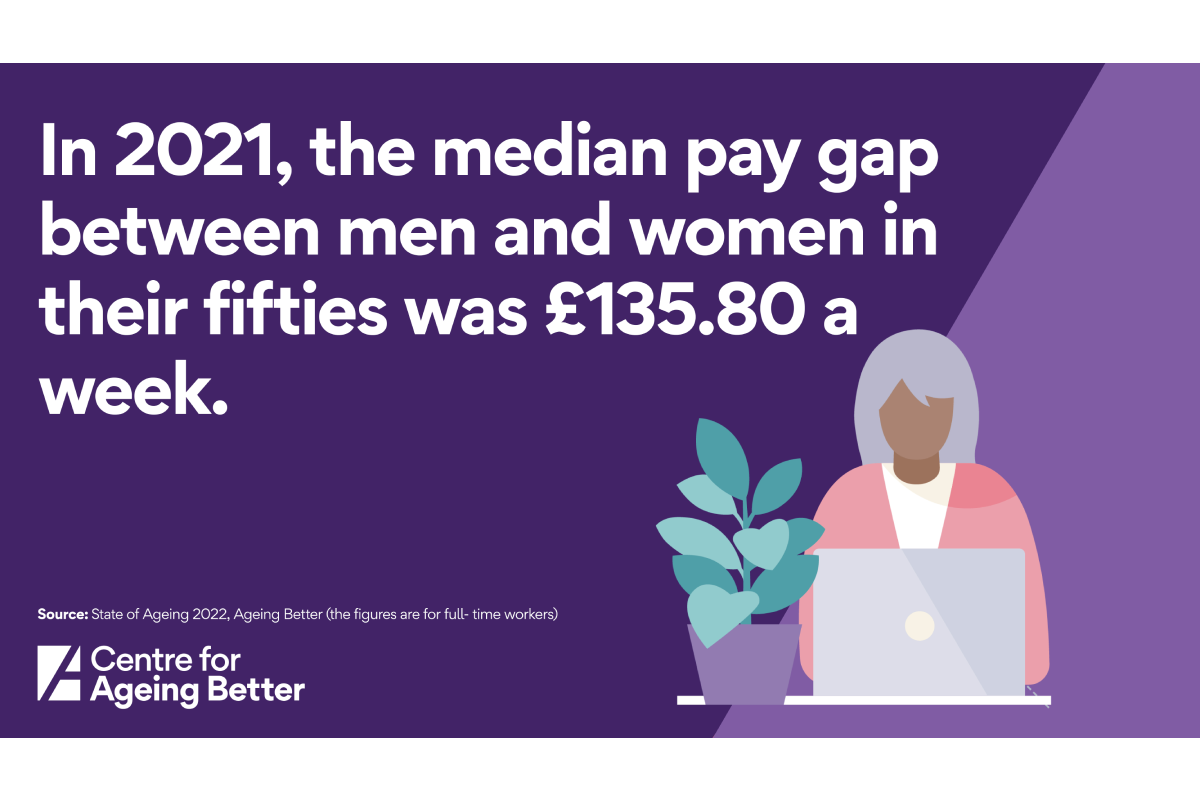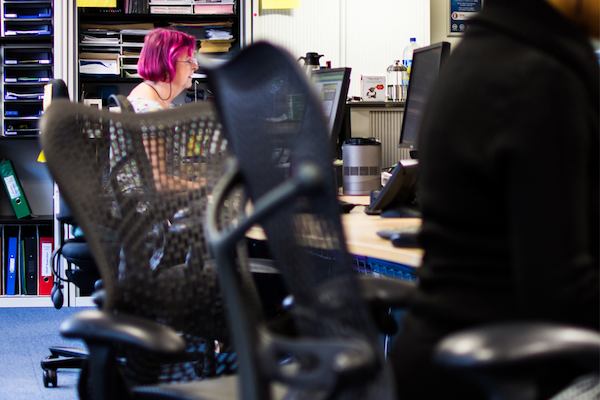We must tackle ageism if we want to achieve gender equality

For International Women’s Day, we look at how gender stereotypes, discrimination and bias all become more damaging and detrimental for women as they get older.
To mark the theme of 'Embrace Equity', our Chief Executive, Dr Carole Easton OBE, explores how ageism combines with gender inequality, and what needs to happen to combat it.
International Women’s Day can be a moment of huge inspiration and solidarity as we unite across the globe but it also serves as a reminder of how far we still need to travel.
Across society, huge inequalities still exist despite decades of 'progress' and I want to provide a snapshot of some key issues where age and gender combine and result in millions of women experiencing double discrimination.
Older women are more likely to be in poverty than men
About one in five female pensioners is living in poverty, with single female pensioners at much higher risk of being in poverty than single men and pensioner couples. The risk of poverty for women is related to their employment history and family circumstances which impact on their pension income and ability to save.
Female part-time workers or women with low grade jobs are at greater risk, and women who have spent most of their lives working part-time are no better off in retirement than women who have never worked. Throughout their lives, women are more likely to take time off for childcare, more likely to have to work part-time, more likely to be in lower-paid jobs than men and less likely to receive a promotion after becoming a parent.
Research shows that women are the primary victims of age discrimination in hiring, which means that women are driven out of the workplace earlier than men and have a much more difficult time finding a way back. The cumulative impact of this means that by age 50, women have saved an average of £56,000 – just half the £112,000 saved by men in their pensions. This imbalance will continue to exist unless there are fundamental changes in the workplace. Women’s roles need to be valued; the strengths, skills and knowledge of older people need to be rewarded and respected; pensions need to be equitable.
Older women are the unpaid carers crucial to the social care and childcare systems
Women are still those most likely to be working part-time, or not at all, to look after children while a huge portion of later life care is provided by unpaid family carers who are predominantly women.
One in four women aged 50-64 have adult or child caring responsibilities, compared to less than one in five men. Caring for a loved one can get increasingly difficult to balance with working lives as we get older, with the peak age for caring falling between 50-64. By the age of 65, less than one in three women are still in employment compared to more than two in five men.
We as a society need to think carefully about this demographic age shift and not just assume that women step into the breach where the formal systems of care fail. We need a childcare and social care system that is fit for purpose to ensure that we are not completely reliant on the heroic efforts of the unpaid and the underappreciated.

Older women are three times more likely to be working part-time than older men
There are three times more women aged 50-64 working part-time than men. This has significant financial implications, one in four older women workers are ineligible for automatic workplace pension enrolment because they work part-time. The gap in the employment rate between men and women aged 50-64 has narrowed slightly since the COVID-19 pandemic began but remains worryingly high and while the gender pay gap of people in their fifties has also narrowed slightly, men still earn more than women. Many women exit the labour market when they have children and do not return.
Flexible working can be essential for those juggling work with caring and responsibilities and Ageing Better has long campaigned for employees to have the right to request flexible working from day one of employment. We also support the Carer’s Leave bill, which would give employees the right to one week of unpaid Carer’s Leave each year, and would like to see it eventually progressed into paid leave for carers.
Women in England spend more years with illness and disability than men
On average, a girl born today in England can expect to live more than a quarter of her expected 83.1 years of life with illness and disability; compared to more than a fifth for a boy born today. At 65, a woman today can expect to spend less than half (47%) of her remaining years in good health, compared to 53% for men. Women from the most deprived areas live twice as many years with disability and illness after 65 than the wealthiest. Most of the conditions that cause disability in our later years are not inevitable – they can be postponed and prevented.
Our network of Age-friendly Communities is determined to create places where people of all ages are able to live healthy and active later lives. Ageing Better is also determined to ensure that homes are safe and healthy places in which to age. Over 4 million homes do not meet the basic Decent Homes Standards with half of these homes of such poor quality they actually put their occupants’ health and safety at risk.
Older female characters are marginalised and underrepresented in British film
Recent research from Ageing Better reveals that older characters, and especially older female characters, continue to be underrepresented in British film. Our research with the University of West London School of Film, Media and Design found that female characters aged 65 years and over are more than three times less likely than men of the same age to have featured in British films over the last decade.
The study also stated that empowered, active and rounded older female characters were rare and older women were much more commonly portrayed as passive, pitiable, ridiculed for failing to act their age and often irrelevant to the main plot. We need greater representation of older age groups in film, particularly older women and older actors from minority ethnic backgrounds, and for industry bodies to routinely monitor the diversity characteristics – including age – of those working in British films, on and off screen.
If we are to overcome this injustice, we need a collective movement to raise awareness and truly embrace equity.
If we are to overcome this injustice, we need a collective movement to raise awareness and truly embrace equity.
Being represented in media and advertising is a key part of feeling listened to, but older women are often not seen in the media, in newspapers, or on our screens. And even when older women are represented, this representation may not be authentic or empowering. Research from the House of Commons Women and Equalities Committee identified that older women feel “invalidated and invisible” because representation is often limited to looking more youthful, and actors with a younger chronological age are used instead of older women themselves.
In order to address the discrimination that older women face we need to change the perceptions and stereotypes that so many hold both about others and about themselves. To achieve this, we need to ensure there are varied and realistic portrayals of women’s lives – something that is rarely achieved in film, television, advertising, newspapers and other media.
We urge media outlets and advertisers to represent older women more authentically. Our Age-positive image library is a great place to find positive and realistic images of over 50s that better reflect the lives and experiences of older people.
Sadly these are just a handful of many examples across many aspects of society where ageism and sexism intersect to compound gender inequality. If we are to overcome this injustice, we need a collective movement to raise awareness and truly embrace equity.

